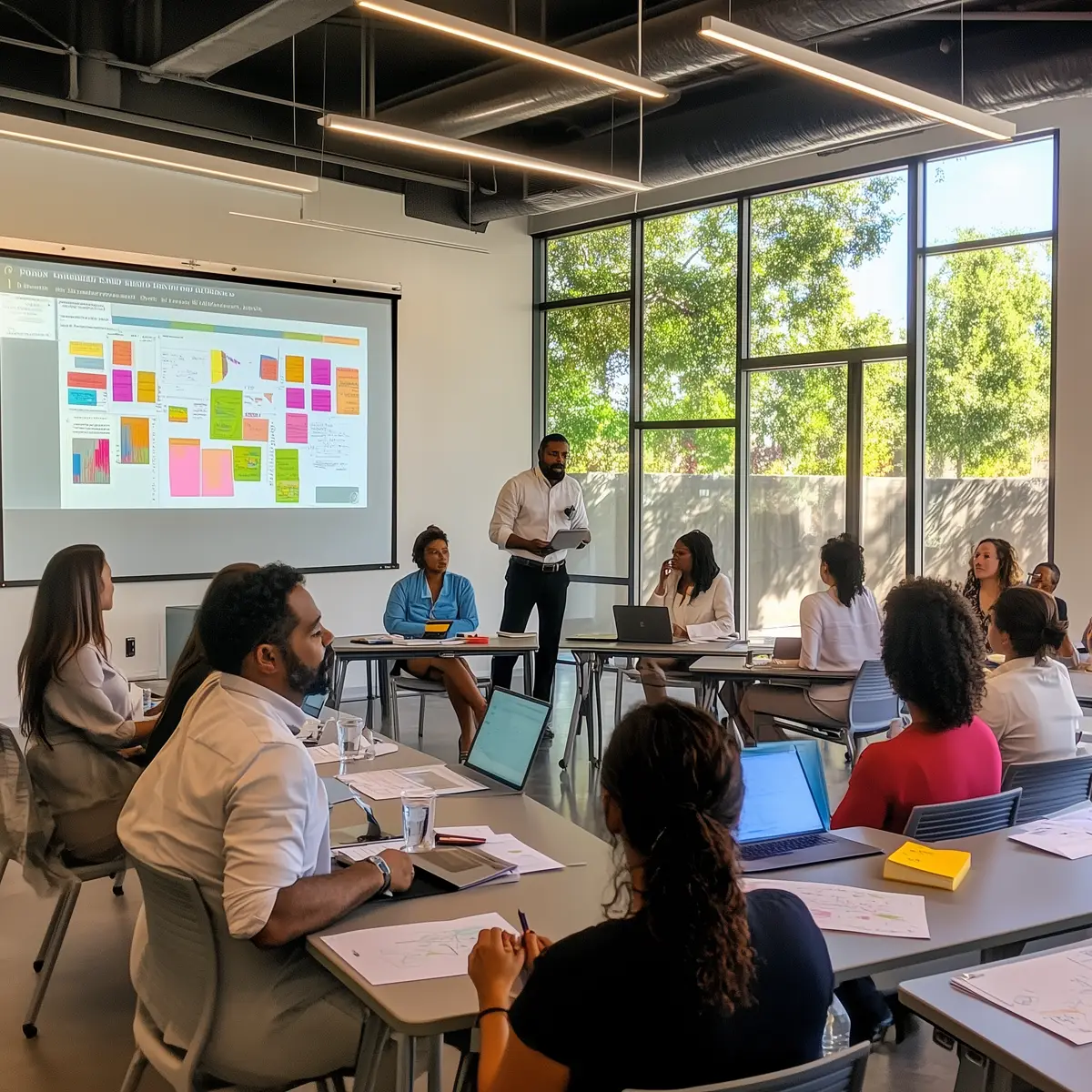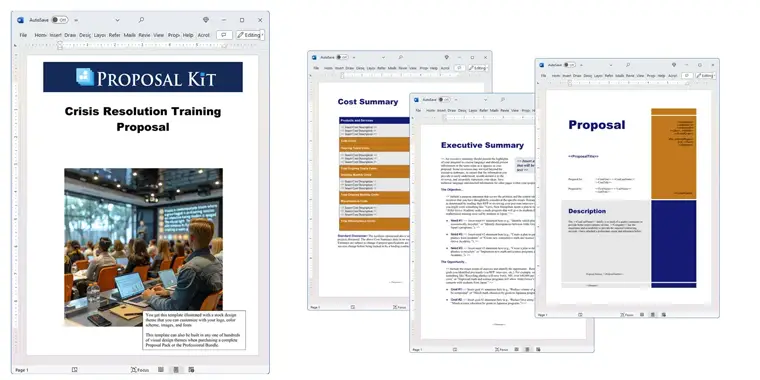How to write your Crisis Resolution Training Proposal
We include this 20 page layout with every Proposal Pack. If you want this template to have a different visual design theme than the one illustrated here, purchase any Proposal Pack design and create this template using the purchased design theme. This template is included in every Proposal Pack. If you get a Proposal Pack or the Professional Bundle, you can also make any variation of this template with different chapters to suit your needs.
We typically include more chapters in the templates than most people will need to give everyone more variety in the chapters they may need. You can trim down a long template by removing pages you do not need or combining multiple chapter topics into one page.
 DOWNLOADABLE, ONE-TIME COST, NO SUBSCRIPTION FEES
DOWNLOADABLE, ONE-TIME COST, NO SUBSCRIPTION FEES If you need this template on DVD media order from our Amazon shop.
If you need this template on DVD media order from our Amazon shop.
You can also create countless variations of this document to suit your needs using the included library of 2200+ chapters if ordering a Proposal Pack or Pro Bundle.
 What Our Clients Say
What Our Clients SayI’m glad you now have general-business proposal templates! Although most of my work is web design I do have the occasional marketing or advertising project for other businesses that I’m asked to bid on. Your templates save me time and make this part of the process much easier."
Related Article
Related Video
Related Templates
- Racial Diversity Training and Awareness Proposal
- Security Training and Consulting Services Proposal
- Training Services Proposal
- Training Plan
- Safety Training and Consulting Services Proposal
- Business Coach Mentoring Services Proposal
- Police Reform Program Proposal
- Awareness and Sensitivity Training in the Workplace Proposal
- Human Resources Training Services Proposal
- Stress Management in Workplace Proposal
- Training Program Curriculum Innovation Proposal
- Emergency Response Planner Training Proposal
- Safety Strategy and Training Program Proposal
- Safety Plan
- Specialized Training Educational Proposal
- Training for Skills Development Proposal
- Emergency Preparation Project Proposal
- Corporate Training Services Proposal Template
- Tutoring Educational Services Proposal
- Interagency Training Center Proposal
- Sales Training Proposal Template
Writing Your Crisis Resolution Training Proposal with Proposal Kit
Writing a crisis resolution training proposal is crucial for training organizations aiming to offer their services to companies facing internal disputes, legal issues, and productivity losses due to unresolved conflicts. A proven way to tackle this task, especially for those new to proposal writing, is by using the Proposal Kit template library and Wizard software program. This approach streamlines the proposal writing process and includes a comprehensive line item quoting database system for financial aspects like cost summaries, estimates, and budgets.
If you're in a position where you need to draft a proposal for any such training program, you're likely looking for a way to ensure your offer stands out while communicating the value of your services.
What Types of Projects Are Crisis Resolution Training Proposals Written For?
Crisis resolution training encompasses various situations tailored to address specific organizational needs. Here are some examples:
- Conflict management workshops for HR departments.
- Negotiation skills training for executives.
- Dispute resolution programs for customer service teams.
- Legal risk mitigation training for compliance officers.
- Productivity improvement seminars focusing on conflict avoidance.
- Team-building retreats with a focus on communication and resolution skills.
- Stress and crisis management training for high-pressure roles.
- Cross-cultural communication training to prevent misunderstandings.
- Leadership training for effective conflict resolution strategies.
- Online dispute resolution training for remote teams.
- Crisis response and intervention training for law enforcement.
Chapters this template is built with
Proposal Kit can assist in this endeavor with templates for every part of your proposal.
Addressing these topics thoroughly in your proposal, with the help of the Proposal Kit, will present a compelling case for your crisis resolution training services. This will demonstrate your understanding of the recipient's needs and your capability to meet them effectively.
Each template is a Word document, making it easy to customize. Once completed, the proposal can be saved as a PDF for delivery, ensuring a professional presentation.
Cover Letter
Begin your proposal with a cover letter that immediately grabs the recipient's attention. Address the urgent need for crisis resolution training within the company, drawing on any known instances of conflict or the potential risks associated with unresolved disputes. Emphasize your training organization's commitment to helping companies navigate these challenges effectively. The goal is to establish a connection and demonstrate understanding from the outset.
Introduction
In the introduction, offer a concise yet informative overview of your training organization. Highlight your expertise in crisis resolution, including any specialized approaches or methodologies you employ. Mention your experience working with similar companies or industries to build credibility and assure the recipient of your ability to address their needs.
Cost Summary
The cost summary should clearly outline the financial investment required for the proposed training services. It should also include a breakdown of costs associated with different aspects of the training, such as instructor fees, materials, and any additional resources. Transparency helps set realistic budget expectations and demonstrates your organization's honesty and fairness.
Needs Assessment
Through a needs assessment, detail the specific conflict-related issues the company is facing. These could include common types of disputes, areas of miscommunication, or recurring challenges that contribute to workplace tension. Tailor this section to the recipient company's context to show a bespoke approach to their problems.
Opportunities
Describe the various benefits the company can expect from resolving these conflict-related issues. Beyond the immediate reduction in disputes, highlight the longer-term advantages, such as improved employee morale, increased productivity, and enhanced corporate reputation. Make the case that investing in crisis resolution training is not just a cost but a strategic opportunity.
Goals and Objectives
List the specific outcomes the training aims to achieve-from better communication and understanding among team members to particular conflict resolution skills. Setting clear, measurable goals helps the recipient visualize the training's impact and sets benchmarks for success.
Negotiations
Explain how negotiation training will be conducted and its benefits. This section should cover the methodologies used, such as role-playing exercises or case studies, and the critical negotiation skills participants will develop. Highlight how these skills can lead to more effective dispute resolution and decision-making within the company.
Training
Describe the training modules and methodologies to be used. Describe the structure of the training program, including any online components, in-person workshops, or ongoing support. Emphasize the training's adaptability to meet the company's specific needs and schedules.
Mitigation
Discuss risk and crisis mitigation strategies that will be included in the training. Focus on preventive measures, such as early warning signs and proactive communication techniques, that can be implemented to avoid conflicts before they escalate.
Conflict Management
Outline the conflict management strategies that participants will learn. This should cover a range of techniques, from mediation to collaborative problem-solving, tailored to different conflict scenarios. Emphasize the practical application of these strategies in the workplace.
Dispute Resolution
Describe the dispute resolution processes included in the training. This section should explain the steps and procedures for formal dispute resolution, including negotiation, mediation, and arbitration. Discuss how these processes can be integrated into the company's existing policies.
Legal Considerations
Highlight any legal aspects of conflict resolution that will be covered. This could include compliance with employment laws, understanding contractual obligations, and the legal implications of different dispute resolution strategies. This knowledge is crucial for avoiding potential legal issues arising from conflicts.
Awareness
Talk about creating an organizational culture that proactively addresses conflict. This involves training leaders and employees to recognize and manage conflict effectively, promoting open communication, and fostering an environment where issues can be discussed openly and constructively.
Recommendations
Provide tailored advice based on the needs assessment and the opportunities identified. These recommendations should be actionable and specific, offering clear steps for the company to implement the training and integrate conflict resolution practices into its operations.
About Us
Introduce your organization, highlighting your credentials, areas of expertise, and success stories. This section should build confidence in your ability to deliver practical crisis resolution training, showcasing your track record of helping companies overcome similar challenges.
Advisors
List experts and advisors who will be involved in the training, including their qualifications and areas of specialty. This adds another layer of credibility and reassurance, showing that knowledgeable professionals will deliver the training.
Code of Conduct
Explain the ethical guidelines governing the training program. These include commitments to confidentiality, respect for all participants, and adherence to professional standards. This assures the company of the integrity and professionalism of your training services.
Use cases for this template
Lara's Leap: Winning a Wellness Workshop
Standing out requires not just expertise but the ability to showcase that expertise compellingly. Lara's Harmony Health Solutions was poised on the edge of a breakthrough, with a series of wellness workshops designed to address physical health and emotional and mental resilience in conflict. The challenge? Convincing a corporate client to invest in her comprehensive wellness approach was a step beyond their usual employee health programs.
Lara turned to Proposal Kit, which offered her a structured way to present her innovative wellness workshops. The templates guided her through framing her proposal, from the cover letter that spelled out the urgent need for such a program in high-stress work environments to the detailed descriptions of her workshops' content, which included mindfulness practices, communication enhancement, and conflict resolution strategies.
The result was a proposal that didn't just speak to the logic of HR managers but resonated with the deeper concerns of corporate leadership about employee turnover, productivity, and workplace harmony. Lara secured the contract by highlighting the direct link between her workshops and improved employee satisfaction and productivity. She set Harmony Health Solutions on a path to becoming a leader in the workplace's intersection of wellness and conflict resolution.
Mike's Midnight Deadline
Tech Innovate, a tech startup, was no stranger to the fast-paced, often high-stress environment that is synonymous with innovation. However, as their teams grew, so did the interpersonal conflicts, threatening the collaborative spirit that had fueled their early successes. Mike, an HR rep with a keen understanding of the underlying issues but limited time, faced the daunting task of proposing a solution that would be both effective and fast to implement.
The Proposal Kit became Mike's ally in this challenge. Its templates helped him articulate the need for a tailored crisis resolution training program beyond generic team-building exercises. He supplemented this with content generated through an AI tool, which allowed him to incorporate data-driven insights into the effectiveness of such programs in similar industry settings.
The final proposal was a testament to Mike's strategic approach, blending the structured format of the Proposal Kit with the innovative use of AI to present a compelling case for immediate action. Presented to the board just in time, it highlighted the urgent need for the training and Tech Innovate's commitment to maintaining a cutting-edge, harmonious work environment. The approval was swift, a testament to the clarity and persuasiveness of Mike's proposal.
Nina's Global Initiative
The Global Peace Foundation, under Nina's direction, was on a mission to foster a world where conflicts are resolved peacefully and collaboratively. The challenge of equipping their diverse, international teams with the skills to handle conflicts in this manner was immense, compounded by the varying cultural contexts in which these teams operated.
Nina's strategic decision to use the Proposal Kit for drafting an RFP for a comprehensive crisis resolution training program was a game-changer. Thanks to the Proposal Kit, the clarity and precision with which the RFP was written allowed for articulating the foundation's unique needs and the context in which the training would be applied. It detailed the skill sets required, the cultural sensitivities, and the adaptability needed from potential training providers.
This RFP caught the attention of leading training organizations, each bringing their expertise and understanding of conflict resolution in diverse environments. The responses offered Nina and the Global Peace Foundation a wealth of options. The success of this RFP was not just in the quality of responses received but in the way it set a precedent for how the foundation approached the development of its global teams, fostering a culture of peace, understanding, and resilience across all levels of the organization. Through the use of Proposal Kit, Nina was able to take a significant step towards realizing the foundation's vision on a global scale.
Conclusions and Recommendations
Whether you're drafting a proposal for a wellness workshop, an urgent training program, or an international training initiative, Proposal Kit provides the tools you need to succeed. From outlining the financial details to writing a compelling narrative about your services, Proposal Kit's templates and software streamline the proposal writing process.
Also Known As
This template may also be referred to in different ways or be used in more specialized situations, such as:
- Conflict Management Training Initiative
- Dispute Resolution Skill Enhancement Program
- Crisis Intervention Training Scheme
- Emergency Response Training Proposal
- Conflict De-escalation Training Plan
- Crisis Management Skill Development Proposal
- Problem Resolution Training Offer
- Situational Management Training Framework
- Crisis Handling Capability Improvement Proposal
- Critical Incident Response Training Agenda
Abstract
 A well-prepared crisis management plan is important for companies facing internal disputes, legal issues, or productivity losses due to unresolved conflicts. Such preparedness ensures business continuity and mitigates the negative effects when a crisis occurs. Developing an effective crisis management training proposal involves understanding the roles of the crisis management team, analyzing potential threats through risk assessment, and creating a robust crisis response plan. The Proposal Kit offers a streamlined way to create these proposals with its templates and Wizard software, providing a comprehensive quoting system for financial planning. These proposals can address various crises, including natural disasters, financial crises, and technological failures, ensuring senior management and key stakeholders are well-prepared to react and minimize harm.
A well-prepared crisis management plan is important for companies facing internal disputes, legal issues, or productivity losses due to unresolved conflicts. Such preparedness ensures business continuity and mitigates the negative effects when a crisis occurs. Developing an effective crisis management training proposal involves understanding the roles of the crisis management team, analyzing potential threats through risk assessment, and creating a robust crisis response plan. The Proposal Kit offers a streamlined way to create these proposals with its templates and Wizard software, providing a comprehensive quoting system for financial planning. These proposals can address various crises, including natural disasters, financial crises, and technological failures, ensuring senior management and key stakeholders are well-prepared to react and minimize harm.
Through creating a proposal, companies can allocate resources and respond to unexpected events. The training covers common situations, from dealing with operational accidents to responding to natural disasters. It emphasizes the importance of crisis communication and coordination with key external stakeholders, such as media outlets, community leaders, and investors, to protect the company's reputation. Important components include risk analysis, activation protocols, and clear team roles to ensure accountability and informed decision-making. By preparing organizations to assess the expected severity and potential impact of crises, these proposals help restore operations swiftly and support sustainable recovery. Developing a culturally sensitive, proactive approach fosters resilience, reduces the likelihood of regulatory fines, and enhances the overall stability of the company's network and infrastructure.
A comprehensive crisis management plan prepares organizations to tackle various crises, ranging from natural disasters to operational accidents and financial crises. The Proposal Kit aids in designing a proposal that outlines a structured approach to crisis management planning. It ensures that the crisis management team is equipped with the necessary tools and strategies to address potential threats. The plan emphasizes the importance of risk management through thorough risk assessment and risk analysis. By assessing the likelihood and expected severity of potential crises, organizations can develop a crisis response plan that minimizes business impact and protects key stakeholders, including senior executives, employees, and external stakeholders such as investors and media outlets.
 When a crisis occurs, the response team's responsibility is crucial in mitigating harm and restoring operations. The crisis plan includes clear communication protocols to share key messages with affected communities and media outlets, ensuring transparency and maintaining the company's reputation. Effective crisis communication involves creating talking points and reports that provide accurate information to key external stakeholders, fostering trust and collaboration during challenging times.
When a crisis occurs, the response team's responsibility is crucial in mitigating harm and restoring operations. The crisis plan includes clear communication protocols to share key messages with affected communities and media outlets, ensuring transparency and maintaining the company's reputation. Effective crisis communication involves creating talking points and reports that provide accurate information to key external stakeholders, fostering trust and collaboration during challenging times.
Training programs outlined in the proposal focus on developing skills for various crisis situations. These include natural disasters, technological failures, and incidents of violence or pandemic outbreaks. By offering templates and checklists, the Proposal Kit assists organizations in preparing for both common and unexpected events. The training also highlights the role of community leaders and partners in supporting recovery efforts, emphasizing the important coordination required to minimize negative effects on affected families and communities.
Furthermore, the proposal underscores the importance of promoting an organizational culture of preparedness and resilience. By involving senior management and community leaders in the training process, companies can learn lessons from past crises and adapt their strategies.
 This proactive approach not only enhances the organization's capability to deal with crises but also serves to minimize potential regulatory fines and financial losses. It fosters an environment where accountability and open communication prevail, enabling companies to allocate resources efficiently and maintain a steady production network despite adverse circumstances. Through continuous monitoring and evaluation, organizations can refine their crisis response strategies, ensuring they remain informed and prepared to handle any future threats.
This proactive approach not only enhances the organization's capability to deal with crises but also serves to minimize potential regulatory fines and financial losses. It fosters an environment where accountability and open communication prevail, enabling companies to allocate resources efficiently and maintain a steady production network despite adverse circumstances. Through continuous monitoring and evaluation, organizations can refine their crisis response strategies, ensuring they remain informed and prepared to handle any future threats.
Frequently Asked Questions
What should a crisis resolution training proposal include?
A comprehensive crisis resolution training proposal should encompass several critical components: an executive summary, objectives and goals, a detailed curriculum, methodologies, a targeted audience, a timeline, a budget, and evaluation metrics. The executive summary provides an overview, while the objectives outline what the training aims to achieve. The curriculum and methodologies sections detail the content and teaching strategies, respectively. Identifying the target audience ensures the training is tailored appropriately, and the timeline and budget offer a practical roadmap and cost breakdown. Lastly, evaluation metrics help measure the program's effectiveness.
How do I identify the target audience for the training?
Identifying the target audience involves understanding who will benefit most from the training and who manages crises within the organization. This typically includes managers, team leaders, HR personnel, and frontline staff interacting directly with customers or clients. Conducting a needs assessment through surveys, interviews, or focus groups can provide insights into the specific challenges faced by different groups within the organization, thereby helping to tailor the training content to address those needs effectively.
What are effective ways to demonstrate the need for crisis resolution training in the proposal?
Presenting data and case studies that highlight past incidents of unresolved conflicts, their impact on the organization, and the potential benefits of training can demonstrate the need for crisis resolution training. These metrics can include employee turnover rates, customer complaints, lost productivity, or even financial losses. Additionally, referencing industry standards and best practices and feedback from employees indicating a desire for better conflict management skills can strengthen the argument for the training's necessity.
How can I ensure the proposal aligns with organizational goals and values?
Begin by thoroughly understanding the organization's mission, vision, and objectives. Incorporate these elements into the proposal by articulating how the training will support and enhance them. For instance, if the organization prioritizes customer satisfaction, emphasize how improved conflict resolution skills can lead to better customer interactions and satisfaction. Similarly, if employee well-being is a core value, highlight how the training can reduce workplace stress and improve morale.
What methods can be used to evaluate the effectiveness of the training?
Evaluating the effectiveness of the training can be done through a combination of qualitative and quantitative methods. Pre- and post-training assessments can measure knowledge gain and skill improvement. Surveys and feedback forms can gather participants' perceptions of the training's relevance and applicability. Tracking key performance indicators like the number of resolved conflicts, employee satisfaction scores, and customer feedback before and after the training can provide concrete evidence of its impact. Implementing follow-up sessions or refresher courses can also help sustain the training benefits.
15% Off Discount
![]() Add To Cart This Word Template Only
Add To Cart This Word Template Only
 Add To Cart Proposal Pack for Any Business
Add To Cart Proposal Pack for Any Business
 Add To Cart Proposal Kit Professional Bundle
Add To Cart Proposal Kit Professional Bundle
 4.7 stars, based on 846 reviews
4.7 stars, based on 846 reviewsProposal Kit chapters used in this template
Cover Letter, Title Page, Table of Contents, Introduction, Opportunities, Needs Assessment, Goals and Objectives, Awareness, Code of Conduct, Legal Considerations, Mitigation, Dispute Resolution, Conflict Management, Negotiations, Training, Cost Summary, Recommendations, About Us, Advisors, Back Page
Included Calculator Spreadheets
These Excel calculator spreadsheets are included with this template. If you purchase a Proposal Pack or the Professional Bundle, these proposal pages are generated using an automated line-item database in the included Wizard software. The calculator spreadsheets are intended for use when purchasing only the static Word template.
You use this proposal for
- General business proposal
- Education, training proposal
- Non-technical proposal
- Service sales proposal
- Security, safety, protection, investigation proposal
How to create this template with Proposal Pack Wizard
You can create this document using any of the logo-designed Proposal Packs. Pick any Proposal Pack with a logo design theme you like best; they will all work equally well. The Proposal Pack for Any Business is the pack with no extra added logos or colors - designed to be used plain or for you to customize with your logos and graphics.
The Proposal Pack design theme you purchase will determine the visual look of this template. The screenshot above only shows the plain generic design theme. Names and stories in examples are fictional; however, the templates are from real client use cases.
We include a library of chapters to be assembled based on your needs. All proposals are different and have different needs and goals. We designed Proposal Pack so you can customize the documents to suit your needs.
You will best create this document using the Proposal Pack Wizard - Expert Edition software to select this template and build it in the Proposal Pack logo design theme of your choice along with any desired customizations (such as adding additional chapters, removing unneeded chapters, changing the order of chapters, and importing your company logo). This template outlines a proposal for the described situation. Each user is responsible for typing in the actual content of the provided pages with their information to complete the proposal. Suggestions in the abstract may include features in higher-end packages and are facilitated by the selection of chapter templates to support the narrative of each proposal, which help guide the user in filling in the details.
You create this template using the Wizard software with an entire Proposal Pack library and software. We include the Expert Edition of the software in the Proposal Kit Professional bundle. Microsoft Word for Windows is required to use the customizing software. You can also edit Word document templates in other office software such as Word for Mac. We will assist Mac users in assembling complex templates for their first project if they do not have the required platform to run the Wizard software.
You only get the single assembled Word document if purchased as a stand-alone template. The individual template products include no other templates, samples, or software.
How to Build Templates Featured on Proposal Kit Website
Many people find the Proposal Kit website after searching for a specific proposal. Once you've purchased and installed the software, how do you build that template you found in the first place? This video shows you how to build any proposal you see on the Proposal Kit website.
Key Takeaways
- The Crisis Resolution Training Proposal is available as a ready-to-edit template.
- You can create unlimited custom variations of this template using a Proposal Pack or the Professional Bundle.
- Using a Proposal Pack or Professional Bundle, you can automate quotes and other financial pages with a line-item database.
- There are no ongoing subscription fees. You get lifetime unlimited use.
- We made Proposal Kit for freelancers, small businesses, and non-profits.
- Proposal Kit product content (templates, samples, software) is 100% written by humans.
 Ian Lauder has been helping businesses write their proposals and contracts for two decades. Ian is the owner and founder of Proposal Kit, one of the original sources of business proposal and contract software products started in 1997.
Ian Lauder has been helping businesses write their proposals and contracts for two decades. Ian is the owner and founder of Proposal Kit, one of the original sources of business proposal and contract software products started in 1997.By Ian Lauder
 Published by Proposal Kit, Inc.
Published by Proposal Kit, Inc.


 Cart
Cart


 Get 15% off ordering today:
Get 15% off ordering today: 

 Facebook
Facebook YouTube
YouTube X
X Search Site
Search Site